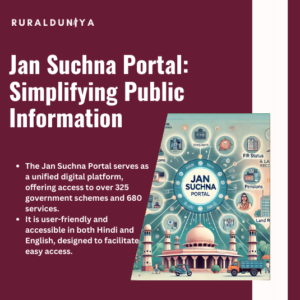The Pradhan Mantri Krishi Sinchai Yojana (PMKSY), launched in 2015, is a flagship government scheme designed to ensure that every farm has access to water through efficient irrigation methods.
Water is the lifeline of agriculture, yet millions of Indian farmers still struggle with water scarcity and unreliable irrigation systems.
Krishi Sinchai Yojana: Ensuring Water for Every Farm
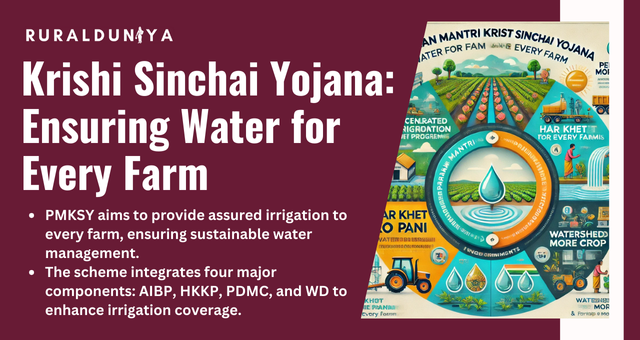
The Government of India introduced the Pradhan Mantri Krishi Sinchai Yojana (PMKSY) in 2015. The scheme’s motto—”Har Khet Ko Pani” (Water for Every Farm) and “Per Drop More Crop”—highlights its focus on water-efficient irrigation and sustainable water management.
A significant portion of Indian agriculture is rain-fed, meaning it relies on seasonal monsoons. This dependency makes farmers vulnerable to droughts, erratic rainfall, and water shortages, leading to low crop productivity and unstable incomes.
The scheme integrates multiple components to create a comprehensive water resource management framework, including:
✔️ Accelerated Irrigation Benefit Programme (AIBP) – Fast-tracking large irrigation projects.
✔️ Har Khet Ko Pani (HKKP) – Expanding minor irrigation and surface water schemes.
✔️ Per Drop More Crop (PDMC) – Promoting drip and sprinkler irrigation for water conservation.
✔️ Watershed Development (WD) – Improving rain-fed agriculture through soil and water conservation.
Objectives of PM Krishi Sinchai Yojana
The main objectives of PMKSY include:
✅ Expanding irrigated land – Increasing the area under assured irrigation for better crop production.
✅ Enhancing water use efficiency – Promoting drip irrigation and sprinkler systems to minimize water wastage.
✅ Conserving rainwater – Implementing check dams, farm ponds, and rainwater harvesting techniques
✅ Reducing dependency on groundwater – Encouraging farmers to use surface water and efficient irrigation methods.
✅ Boosting farmers’ income – Ensuring stable and higher crop yields by providing timely and adequate irrigation.
Aims of PMKSY
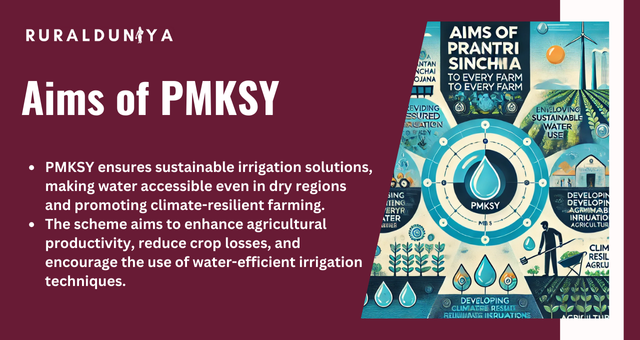
The long-term aims of PMKSY are:
✔️ Providing assured irrigation to every farm – Making irrigation accessible even in dry regions.
✔️ Improving agricultural productivity – Reducing crop losses due to water shortages.
✔️ Encouraging sustainable water use – Promoting water-efficient irrigation methods.
✔️ Developing climate-resilient agriculture – Helping farmers adapt to changing weather patterns.
Benefits of Krishi Sinchai Yojana
Since its launch, PMKSY has delivered significant benefits to Indian farmers, including:
🌿 Increased irrigation coverage – Over 22 lakh hectares of land has come under assured irrigation.
🌿 Higher water use efficiency – Micro-irrigation adoption has led to 30-50% water savings.
🌿 Improved groundwater recharge – Check dams and rainwater harvesting projects have boosted water tables.
🌿 Enhanced crop productivity – Farmers using drip irrigation report 30-40% higher yields.
🌿 Greater financial security – Reduction in crop failures due to better irrigation access.
🌿 Sustainable farming practices – Encouragement of eco-friendly water conservation techniques.
PMKSY Scheme Details
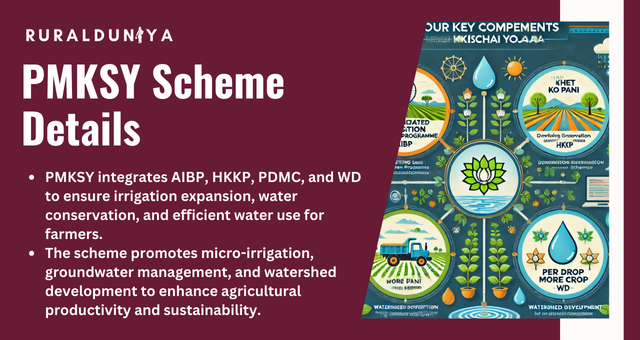
The four key components of PMKSY are:
1️⃣ Accelerated Irrigation Benefit Programme (AIBP)
- Focuses on completing large irrigation projects.
- Targets pending major and medium irrigation schemes.
2️⃣ Har Khet Ko Pani (HKKP)
- Develops minor irrigation systems.
- Promotes groundwater and surface water management.
3️⃣ Per Drop More Crop (PDMC)
- Encourages water-efficient irrigation techniques.
- Supports subsidized drip irrigation and sprinkler irrigation systems.
4️⃣ Watershed Development (WD)
- Targets rain-fed agricultural areas.
- Improves soil conservation, afforestation, and water harvesting.
PMKSY in Different States
Madhya Pradesh (MP)
🚜 Focus on expanding minor irrigation projects.
🚜 Over 3 lakh hectares of land brought under assured irrigation.
Karnataka
💧 Strong emphasis on watershed management and micro-irrigation.
💧 Drip irrigation subsidies introduced for farmers.
Uttar Pradesh (UP)
🌾 Canal modernization projects launched.
🌾 Over 1.2 million farmers benefited from improved irrigation facilities.
How to Apply for PMKSY Online?
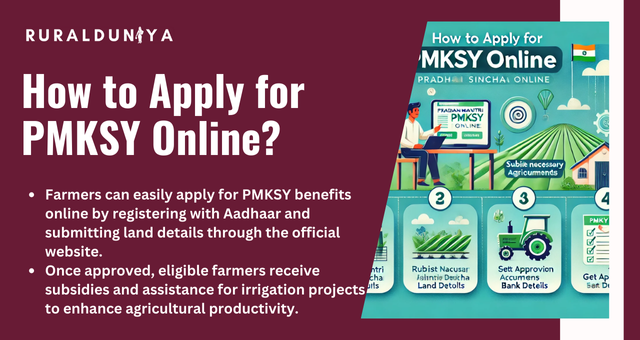
Farmers can apply through:
1️⃣ Visit the PMKSY official website → https://pmksy.gov.in/
2️⃣ Register with Aadhaar and land details
3️⃣ Submit documents (land records, identity proof, bank details)
4️⃣ Approval from authorities → Receive agriculture subsidy and benefits
Funding Pattern of PM Krishi Sinchai Yojana
💰 Central Government: 75% of total funding
💰 State Governments: 25% contribution
💰 Special Category States (NE, Himalayan States, J&K, Ladakh): 90% Central funding
The government has allocated ₹93,068 crores to PMKSY till 2026.
Key Takeaways
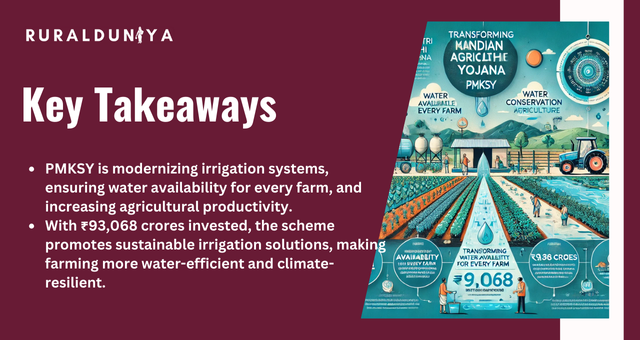
The Pradhan Mantri Krishi Sinchai Yojana (PMKSY) is transforming Indian agriculture by ensuring water availability for every farm. Through irrigation system modernization, water conservation, and micro-irrigation subsidies, the scheme is helping farmers increase productivity and income.
With ₹93,068 crores invested, PMKSY will continue to provide sustainable irrigation solutions, making farming more water-efficient and climate-resilient.
FAQs
What is the main purpose of PMKSY?
PMKSY aims to provide water to every farm in India by expanding irrigation, promoting water conservation, and improving irrigation efficiency through micro-irrigation systems like drip and sprinkler irrigation.
Who can apply for PMKSY benefits?
Any farmer, including small and marginal farmers, can apply for PMKSY benefits. They need to register online on the PMKSY portal or visit their state agriculture department for assistance.
What financial support does PMKSY offer?
The scheme provides subsidies for irrigation infrastructure, micro-irrigation systems, and water conservation projects. The funding is shared between the central and state governments.
How can farmers apply for PMKSY online?
Farmers can apply by visiting the official PMKSY website, filling out the application form, and submitting required documents like Aadhaar, land records, and bank details.

Nishank is a social impact enthusiast with a solid foundation in public policy, micro-enterprise, and agribusiness. Growing up in a farmer’s family has given him a profound connection to rural communities, fueling his passion to empower people towards self-reliance. He completed his undergraduate studies at the Delhi University and earned a master’s degree in Rural Management from National Institute of Rural Development & Panchayati Raj in Hyderabad.


